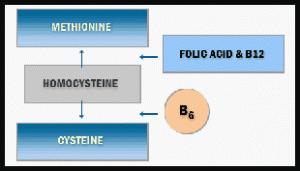The May 2003 issue of the medical journal “Clinical Practice” contains an article by the dietician Andrea Miller (pages 46 to 49) about supplementation with these vitamins in relation to hardening of the arteries from too much of the amino acid homocysteine.
Homocysteine is an amino acid that contains sulfur, which is formed from the metabolism of methionine, an essential amino acid that we depend on in our food for maintaining a normal metabolism. There are complex metabolic pathways that involve several enzymes to function normally, which involve the three vitamins B-6, B-12 and folic acid (folate) to balance everything.
If one of these vitamins or any of the enzymes involved malfunction, a surplus of homocysteine results with an accelerated hardening of the arteries throughout the body. A certain percentage of the population does not have the full concentration of one or more of the metabolic enzymes in their system. If the food we eat is also relatively deficient in the above named vitamins, the body runs out of alternative metabolic options and produces dangerous levels of homocysteine. A normal blood level of homocysteine is between about 5 and 10 micro-mol per liter. This is not routinely measured by screening tests unless the doctor suspects a genetic trait in the family where family members tend to get heart attacks at an early age (mid 30’s to early 40’s). When the level of homocysteine is elevated to 12 micro-mols per liter, a supplement with folic acid of 1 mg per day would reduce this by 25% to safe levels of 9 micro-mols per liter. This results in a 15% decrease of the death rate from heart attacks.
Vitamin B-12 is found in animal products such as meat, poultry and dairy products. Vegetarians may not get enough Vit. B-12 and should supplement as should persons above the age of 50. A lack of B-12 vitamin leads to pernicious anemia.
Vitamin B-6 is found widely distributed in meat, fortified grains and poultry and usually is in our food supply to a satisfactory degree.
Folate (folic acid) is contained in orange fruits, beans, lentils and green vegetables. However, not everybody eats well banced meals and the food supply could be marginally deficient in folate.
Recommendation: The take home message is that a good multivitamin tablet containing about 400 to 600 micrograms (=0.4 to 0.6 mg) of folate (folic acid), 5 mg of vitamin B-6 and 20 micrograms of vitamin B-12 would be providing an adequate amount of these vitamins and reduce homocysteine levels in most people to safe levels. It is not recommended to take single vitamin supplements of these vitamins as this could lead to toxicity. Also, there is no point in taking higher doses of the vitamins as this also would lead to toxic reactions.
Link to information about balanced nutrition: http://www.nethealthbook.com/articles/nutrition.php
Last edited December 9, 2012






